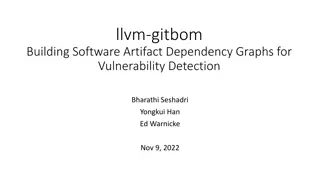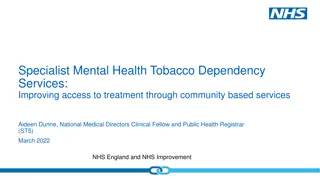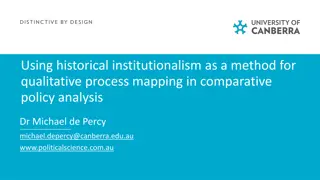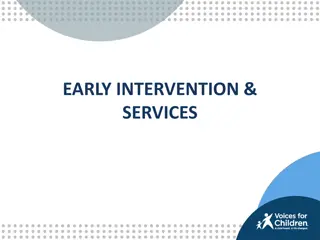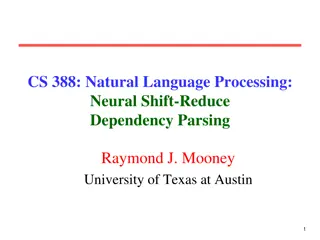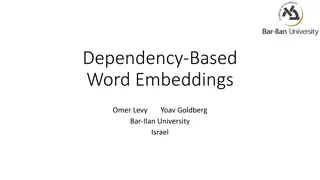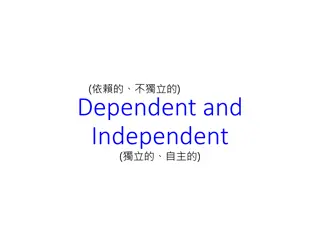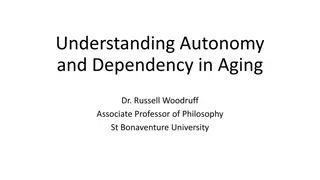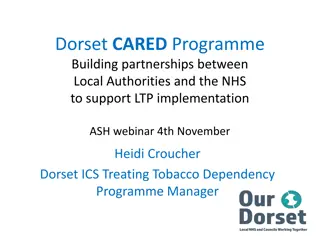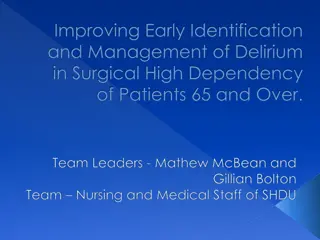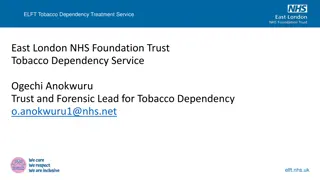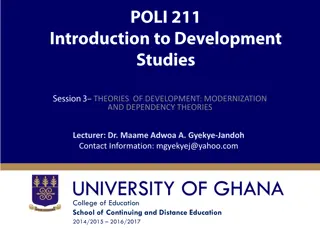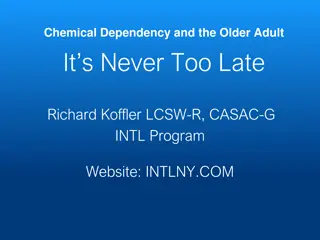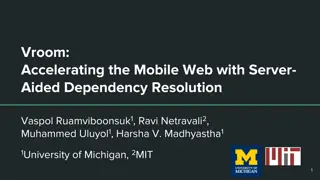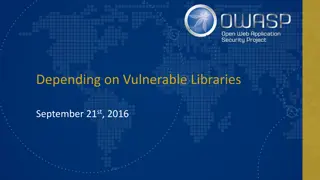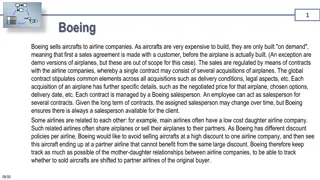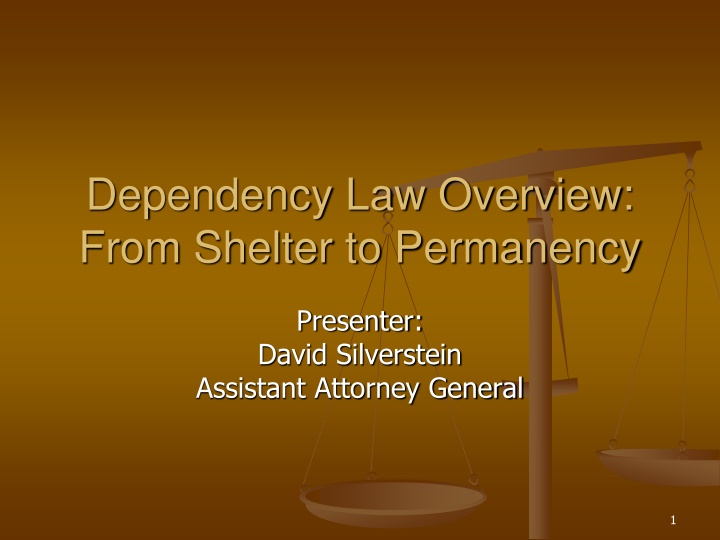
Overview of Dependency Law in Florida: Key Aspects and Considerations
Explore the comprehensive overview of Dependency Law in Florida presented by Assistant Attorney General David Silverstein. The presentation covers key aspects such as the sources of Dependency Law, the intent of Chapter 39, statutory definitions of dependent children, and more. Gain insights into the protection, safety, and well-being of children, permanent placement in foster care, and important legal definitions within the context of Dependency Law.
Uploaded on | 2 Views
Download Presentation

Please find below an Image/Link to download the presentation.
The content on the website is provided AS IS for your information and personal use only. It may not be sold, licensed, or shared on other websites without obtaining consent from the author. If you encounter any issues during the download, it is possible that the publisher has removed the file from their server.
You are allowed to download the files provided on this website for personal or commercial use, subject to the condition that they are used lawfully. All files are the property of their respective owners.
The content on the website is provided AS IS for your information and personal use only. It may not be sold, licensed, or shared on other websites without obtaining consent from the author.
E N D
Presentation Transcript
Dependency Law Overview: From Shelter to Permanency Presenter: David Silverstein Assistant Attorney General 1
Sources Of Dependency Law Chapter 39, Florida Statutes Rule 8, Florida Rules of Juvenile Procedure Florida Administrative Code 65C DCF Operating Procedures Interstate Compact on the Placement of Children F.S. 409.401 2
Sources Of Dependency Law Adoption and Safe Families Act 42 U.S.C. 620 Indian Child Welfare Act 25 U.S.C.S. 1901 Master Trust F.S. 402.17 Independent Living 409.1451 Medical Examination and Treatment F.S. 743.0645 3
Intent of Chapter 39 F.S. 39.001 Protection, safety and well-being of a child. Prevention and intervention should engage families in constructive, supportive, and nonadversarial relationships. Prevention and intervention should intrude as little as possible into family life. Preserve and strengthen family ties. 4
Intent of Chapter 39 F.S. 39.001 Permanent placement of children in foster care with biological or adoptive family as soon as possible and no longer than one year. Keep siblings in the same home. System of partnership between DCF, other agencies, and local communities. 5
Statutory Definitions F.S. 39.01(15) Dependent Child To have been abandoned, abused, or neglected by the child s parent or parents or legal custodians. To be at substantial risk of imminent abuse, abandonment, or neglect by the parent or parents or legal custodians. 6
Statutory Definitions F.S. 39.01(15) To have no parent or legal custodians capable of providing supervision and care. To have been sexually exploited and to have no parent, legal custodian, or responsible adult relative currently known and capable of providing the necessary and appropriate supervision and care. 7
Statutory Definitions F.S. 39.01(15) To have been surrendered to the department or a licensed child-placing agency for purpose of adoption. To have been voluntarily placed with a licensed child-placing agency for the purposes of subsequent adoption, and a parent or parents have signed a consent pursuant to the Florida Rules of Juvenile Procedure. 8
Statutory Definitions F.S. 39.01(15) To have been voluntarily placed with a licensed child-caring agency, a licensed child-placing agency, an adult relative, or the department, after which placement, under the requirements of this chapter, a case plan has expired and the parent or parents or legal custodians have failed to substantially comply with the requirements of the plan. 9
Statutory Definitions 39.01(51) Party The parent or parents of the child, the petitioner, the department, the guardian ad litem or the representative of the guardian ad litem program when the program has been appointed, and the child. 10
Statutory Definitions F.S. 39.01(50) Participant Any person who is not a party but who should receive notice of hearings involving the child, including the actual custodian of the child, the foster parents or the legal custodian of the child, identified prospective parents, and any other person whose participation may be in the best interest of the child. 11
Statutory Definitions F.S. 39.01(50) A community-based agency under contract with DCF to provide protective services may be designated as a participant at the discretion of the court. Participants may be granted leave by the court to be heard without the necessity of filing a motion to intervene. 12
Statutory Definitions F.S. 39.01(12) Child Any unmarried person under the age of 18 years who has not been emancipated by order of the court. 13
Statutory Definitions F.S. 39.01(49) Parent A woman who gives birth to a child and a man whose consent to the adoption of the child would be required under F.S. 63.062(1). Adoptive mother or father of the child. 14
Statutory Definitions F.S. 39.01(49) Parent does not include an individual whose parental relationship to the child has been legally terminated, or an alleged or prospective parent, unless the parental status falls within the terms of F.S. 39.503(1) or F.S. 63.062(1). 15
Statutory Definitions F.S. 39.01(49) Pursuant to F.S. 63.062(1), written consent for adoption required from father if: Minor was conceived or born while the father was married to the mother; Minor is his child by adoption; 16
Statutory Definitions F.S. 39.01(49) Minor has been adjudicated by the court to be his child; He has filed an affidavit of paternity pursuant to F.S. 382.013(2)(c) or he is listed on the child's birth certificate; or 17
Statutory Definitions F.S. 39.01(49) An unmarried biological father, Has acknowledged in writing, signed in the presence of a competent witness, that he is the father of the minor, Has filed such acknowledgment with the Office of Vital Statistics of the Department of Health within the required timeframes, and Has complied with the requirements of F.S. 63.062(2). 18
Statutory Definitions F.S. 39.01(49) For purposes of Chapter 39 only, when the phrase "parent or legal custodian" is used, it refers to rights or responsibilities of the parent and, only if there is no living parent with intact parental rights, to the rights or responsibilities of the legal custodian who has assumed the role of the parent. 19
Statutory Definitions F.S. 39.01(60) Prospective Parent Person who claims to be, or has been identified as, a person who may be a mother or a father of a child. 20
Statutory Definitions F.S. 39.01(1) Abandonment Situation in which the parent or legal custodian of a child or, in the absence of a parent or legal custodian, the caregiver, while being able, has made no significant contribution to the child s care and maintenance or has failed to establish or maintain a substantial and positive relationship with the child, or both. 21
Statutory Definitions F.S. 39.01(1) Establish or maintain a substantial and positive relationship includes, but is not limited to, frequent and regular contact with the child through frequent and regular visitation or frequent and regular communication to or with the child, and the exercise of parental rights and responsibilities. 22
Statutory Definitions If efforts to support and communicate with the child are, in the opinion of the court, only marginal efforts that do not evince a settled purpose to assume all parental duties, court may declare the child to be abandoned. Abandoned" does not include abandoned newborn infant under F.S. 383.50, a child or family in need of services under F.S. 984. 23
Statutory Definitions F.S. 39.01(1) Man's acknowledgement of paternity of the child does not limit the period of time considered in determining whether the child was abandoned. Incarceration, repeated incarceration, or extended incarceration of a parent, legal custodian, or caregiver responsible for a child's welfare may support a finding of abandonment. 24
Statutory Definitions F.S. 39.01(44) Neglect Child is deprived of, or is allowed to be deprived of, necessary food, clothing, shelter, or medical treatment or a child is permitted to live in an environment when such deprivation or environment causes the child's physical, mental, or emotional health to be significantly impaired or to be in danger of being significantly impaired. 25
Statutory Definitions F.S. 39.01(44) Not neglect if caused primarily by financial inability unless actual services for relief have been offered to and rejected. A parent or legal custodian legitimately practicing religious beliefs in accordance with a recognized church or religious organization who does not provide specific medical treatment for a child may not, for that reason alone, be considered a negligent parent or legal custodian; however, a court can order treatment for the child. 26
Statutory Definitions F.S. 39.01(2) Abuse Any willful act or threatened act that results in any physical, mental, or sexual abuse, injury, or harm that causes or is likely to cause the child's physical, mental, or emotional health to be significantly impaired. 27
Statutory Definitions F.S. 39.01(30) Harm Harm to a child's health or welfare can occur when any person: Inflicts or allows to be inflicted upon the child physical, mental, or emotional injury. Certain factors must be considered in evaluating injury such as child s age, prior history of injury, location of injury on body, multiplicity of injury, and type of trauma. 28
Statutory Definitions F.S. 39.01(30) Types of injuries include: Various types of physical trauma. Purposefully giving a child poison, alcohol or drugs. Leaving a child without adult supervision. Inappropriate or excessive discipline. 29
Statutory Definitions F.S. 39.01(30) Commits, or allows to be committed, sexual battery, or lewd or lascivious acts against the child. Allows, encourages, or forces the sexual exploitation of a child. Exploits a child, or allows a child to be exploited. Abandons the child. Neglects the child. 30
Statutory Definitions F.S. 39.01(30) Exposes a child to a controlled substance or alcohol by: A test, administered at birth, which indicated that the child s blood, urine, or meconium contained any amount of alcohol or a controlled substance or metabolites of such substances, the presence of which was not the result of medical treatment administered to the mother or the newborn infant. 31
Statutory Definitions F.S. 39.01(30) Continued chronic and severe use of a controlled substance or alcohol by a parent when the child is demonstrably adversely affected by such usage. 32
Statutory Definitions F.S. 39.01(30) Uses mechanical devices, unreasonable restraints, or extended periods of isolation to control a child. Engages in violent behavior that demonstrates a wanton disregard for the presence of a child and could reasonably result in serious injury to the child. 33
Statutory Definitions F.S. 39.01(30) Negligently fails to protect a child in his or her care from inflicted physical, mental, or sexual injury caused by the acts of another. Has allowed a child's sibling to die as a result of abuse, abandonment, or neglect. Makes the child unavailable for the purpose of impeding or avoiding a protective investigation unless the court determines that the parent, legal custodian, or caregiver was fleeing from a situation involving domestic violence. 34
Statutory Definitions F.S. 39.01(34) and (79) Legal Custody Temporary Legal Custody Legal status created by a court which vests in a custodian of the person or guardian, whether an agency or an individual, the right to have physical custody of the child and the right and duty to protect, nurture, guide, and discipline the child and to provide him or her with food, shelter, education, and ordinary medical, dental, psychiatric, and psychological care. 35
INVESTIGATION F.S. 39.301 Child Abuse Hotline receives a report. Report, if accepted, is referred to local DCF office for investigation immediately or within 24 hours. Investigation is commenced by Child Protective Investigator (CPI). 36
INVESTIGATION F.S. 39.301(9)(a) Review all relevant information. Consult with law enforcement, CPT, DV shelter or advocate, or substance abuse or mental health professional, if necessary. Face to face interviews with child, siblings, parents, legal custodians, and caregivers. 37
INVESTIGATION F.S. 39.301(9)(a) Access who is living in child s residence. Determine whether child in the family or household has been abused, abandoned or neglected, any current or past injuries, and who is the person responsible. Assessment of the safety of the child including collateral contacts. 38
INVESTIGATION F.S. 39.301(9)(a) Document present and impending danger based on identification of inadequate protective capacities. 39
INVESTIGATION F.S. 39.301(9)(a) Present danger means a significant and clearly observable family condition that is occurring at the current moment and is already endangering or threatening to endanger the child. Present danger threats are conspicuous and require that an immediate protective action be taken to ensure the child's safety. F.S. 39.01(58). 40
INVESTIGATION F.S. 39.301(9)(a) Impending danger means a situation in which family behaviors, attitudes, motives, emotions, or situations pose a threat that may not be currently active but that can be anticipated to become active and to have severe effects on a child at any time. F.S. 39.01(31). 41
SAFETY PLAN F.S. 39.301(9)(a) If present or impending danger is identified, the CPI must implement a safety plan or take the child into custody. If present danger is identified and the child is not removed, the CPI shall implement a safety plan before leaving. 42
SAFETY PLAN F.S. 39.301(9)(a) If impending danger is identified, the CPI shall create a safety plan as soon as necessary to protect the child. Safety plan means a plan created to control present or impending danger using the least intrusive means appropriate to protect a child when a parent, caregiver, or legal custodian is unavailable, unwilling, or unable to do so. F.S. 39.01(68). 43
SAFETY PLAN F.S. 39.301(9)(a) Safety plan must be specific, sufficient, feasible, and sustainable in response to the realities of the present or impending danger. Safety plan may be in-home or out-of- home plan, or combination of both. Safety plan may include tasks or responsibilities for a parent, caregiver, or legal custodian. 44
SAFETY PLAN F.S. 39.301(9)(a) Safety plan may not rely on promissory commitments of a parent, caregiver, or legal custodian who is currently not able to protect the child or on services that are not available or will not result in safety for the child. Safety plan may not be implemented if for any reason the parents, guardian, or legal custodian lacks the capacity or ability to comply with the plan. 45
SAFETY PLAN F.S. 39.301(9)(a) If DCF is unable to develop a plan that is specific, sufficient, feasible and sustainable, DCF shall file a shelter petition. The CPI may modify the safety plan if there is additional impending danger. If any party to safety plan fails to comply with the safety plan resulting in the child being unsafe, DCF shall file a shelter petition. 46
SAFETY PLAN DOMESTIC VIOLENCE F.S. 39.301(9)(a) CPI shall implement separate safety plans for the perpetrator of domestic violence and the parent who is the victim of domestic violence. Purpose of the injunction is to implement a safety plan for the perpetrator and to impose any other conditions to protect the child. The victim s safety plan may not be shared with the perpetrator. 47
SAFETY PLAN DOMESTIC VIOLENCE F.S. 39.301(9)(a) If the perpetrator is not the parent, guardian, or legal custodian, the CPI shall seek a Chapter 39 injunction. Reasonable cause exists for an injunction if there is evidence of child abuse or if there is a reasonable likelihood of such abuse occurring based on a recent overt act or failure to act. F.S. 39.504(1). 48
SAFETY PLAN F.S. 39.301(9)(a) CPI shall collaborate with CBC lead agency in the development of the safety plan. CPI shall identify services necessary for implementation of the safety plan. CPI and CBC shall mobilize service resources to assist all parties in complying with safety plan. CPI shall monitor the safety plan until transferred to CBC who shall then monitor safety plan. 49
Child Abuse Investigation No Removal - F.S. 39.301(9)(b)1 Voluntary Services If the CPI determines that the interests of the child and the public will be best served by providing the child care or other treatment voluntarily accepted by the child and the parents or legal custodians, the parent or legal custodian and child may be referred for such care, case management, or other community resources. 50

